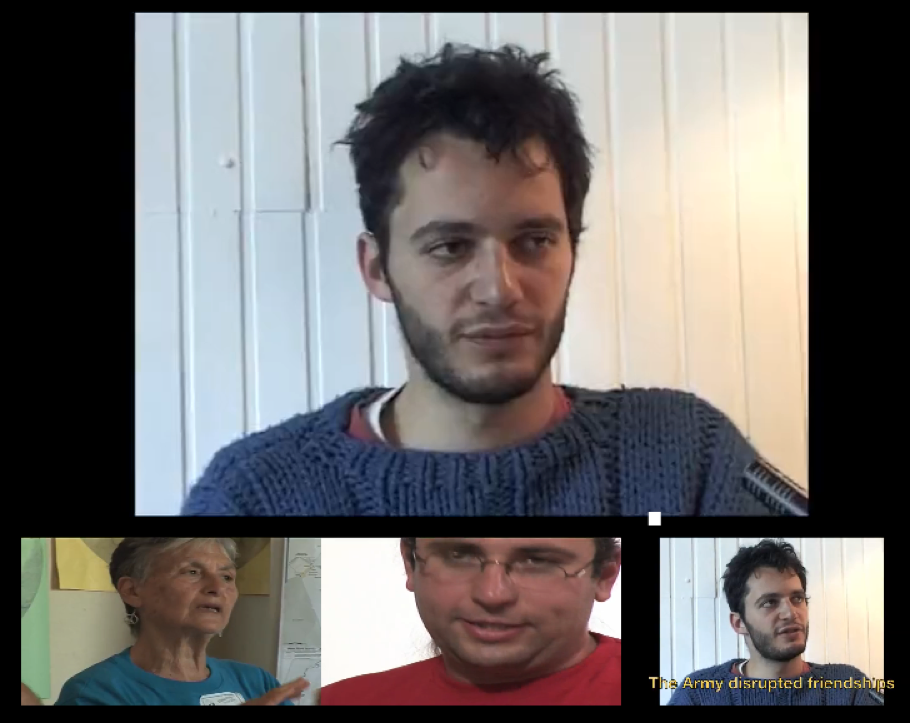The Only Democracy? » Human Rights Activists in the Crosshairs » Breaking in with intent to terrorise, by Haggai Mata
Breaking in with intent to terrorise, by Haggai Mata
Translation from Hebrew: Dimi Reider.

A resident of Nilin is trying to restore a room in his house, completely wrecked by soldiers during a 4-day punitive curfew in response to protests, July 2008. The soldiers entered the residence while the owners were locked up in another house. Photo: Activestills.org
There was one point that stood out for me in Uri Blau’s recollection of his pursuit by the Shin Bet in the Anat Kamm affair. Blau, Haaretz’s outstanding investigative reporter, recalls how as he was traveling in the Far East he got a call saying his house was broken into. “It looks like they were looking for something,” said the policeman on the phone. Reading this reminded me how they broke into my home, too.
It was about 8 years ago. I was active for the Shimnistim Letter (a statement of refusal by conscientious draft objectors), and I was one of those tasked with coordinating the signatories’ name lists. One day, my parents’ home was broken into, and my computer was taken. Nothing else. Computers belonging to other family members, money, valuables were all spared. In the same month, break-ins took place in the homes of prominent activists in Courage to Refuse and Yesh Gvul, two other conscientious objection organisations. The houses were all turned upside down, and in all of them the only items missing were computers with CO name lists.
I remember being appalled – not really comprehending back then how Israeli “security forces” operated – and as the years went by, I learned to smile back at my naivety. But reading Blau’s account today got me wondering. Why, come to think of it, do they need to break into our homes? After all, there are legal routes to obtain search warrants and confiscate computers, in a perfectly orderly manner. If they could legally confiscate “Anarchists Against the Wall” t-shirts from the home of one of my friends, or if they found an ex-Mossad, friendly judge to discuss the gag order on the Anat Kamm affair – in other words, if the law is on their side, they could’ve knocked on our door and confiscate everything legally. So why burgle?
The answer is that breaking in signifies the deeper truth about the nature of their work. Like the policeman who handcuffs a demonstrator, beats him up out of the camera’s sight and then claims he used reasonable force; or like the Mossad that murders people in faraway countries without ever admitting it – the innermost essence of the Shin Bet is embedded into such break-ins. A break-in like that is a statement: “We are the law, and we are above the law, and under the radar of the law, as we please”; and also, “you know it’s us, and there’s nothing you can do about it”; and at the end of the day, “we are everywhere in your life, all the time, and don’t you forget it.” It’s breaking in with intent to terrorise.
Not too long after the break-in I was already in jail [for conscientious objection – D.R.], and my room and belongings have been searched many times. And still, few experiences can be as humiliating as finding out someone roamed over your things without your presence. It’s not for nothing that the law says searches must be conducted in the presence of two witnesses; and it’s not for nothing that this law doesn’t apply in the Occupied Territories, where activists, academics, farmers, workers, teachers and children are dragged from their beds into the streets in the dead of night, and are only allowed to return once their home has been thoroughly turned upside down. I’ve seen them: Coming back and digging through what had been a wardrobe, a bed or a chest of drawers, trying to figure out what had survived, and trying to second-guess the thoughts of these demigods, omnipotent and omnipresent, who went through their belongings and left but destruction in their wake.
Uri Blau is in exile in Britain, his email and his phone are tapped, and he is threatened with interrogation and arrest if he dares to return to Israel. He is also awaited by his upturned flat, a silent testimony to the terror hovering over all of us.
Filed under: Human Rights Activists in the Crosshairs · Tags: Anat Kam, Raid, Uri Blau








 “You have a choice! Israeli Anti-Militarists Speak”
“You have a choice! Israeli Anti-Militarists Speak”